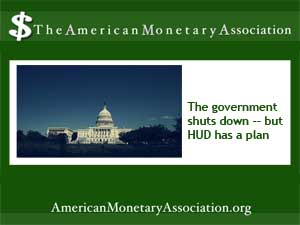
It’s official: the government is shutting down for an unspecified period of time as lawmakers on both sides of the aisle struggle to play nice. The situation is sending ripples throughout the economy, as government-sponsored programs of all kinds come to a standstill and workers go home without pay. Not surprisingly, housing advocates and investing professionals worry about a stall in the housing recovery if government agencies that underwrite and service home loans end up closing their doors. It so happens, though, that the Department of Housing and Urban Development has a contingency plan for just such a situation.
The government has taken time outs before, leaving consumers and service providers scrambling to keep things moving smoothly until the crisis is resolved. In the current situation, though, housing advocates and representatives fear that a shutdown could mean a moratorium on mortgage loans – a key piece of keeping the housing recovery going. So mortgage lenders, housing advocates and real estate professionals are all taking a closer look at HUD’s contingency planning.
Although government’s role in housing has been the subject of recent debates and the target of new bills floated by both parties, for now various government backed entities, including the Federal Housing Administration and quasi-government bodies Fannie Mae and Freddie Mac, originate about two thirds of the residential mortgages available both to investors and residential homebuyers in the country. A government shut down of whatever duration could stall new lending and the processing of current loans.
But HUD has a plan although a new report by HousingWire points out that the plan seems to
be constantly changing, leaving housing professionals scrambling to get the latest information. The most recent version available allows for HID to continue to endorse lending in the wake of a shutdown – but only for single-family home loans.
Under the housing contingency plan, the FHA would be able to generate single-family home mortgages during a government shutdown. A small percentage of HUD’s more than 9,000 staffers would also stay on the job to process new loans.
Because mortgages originating with the FHA and its cousins Fannie and Freddie are serviced by banks and other financial institutes around the country, private lenders are also keeping an uneasy eye on the machinations in Washington and the final outcome of HUD’s contingency planning.
It’s unclear how long a government shutdown could last – the doors may stay closed until both sides of the aisle see eye to eye. But HUD’s contingency plans acknowledge the importance of keeping the housing recovery on track in any case. And that’s good news for investors building wealth through residential real estate — as Jason Hartman advises. (Top image: Flickr/vinothchander)
The American Monetary Association is the source for financial news you can use. Read more from our archives:
These Statistics Aren’t Dull to First-Time Buyers
Investing on the Go: 5 Useful Apps
The American Monetary Association Team

